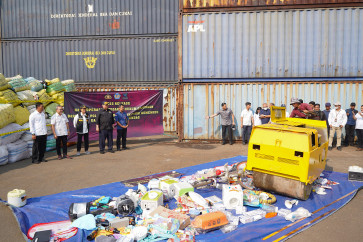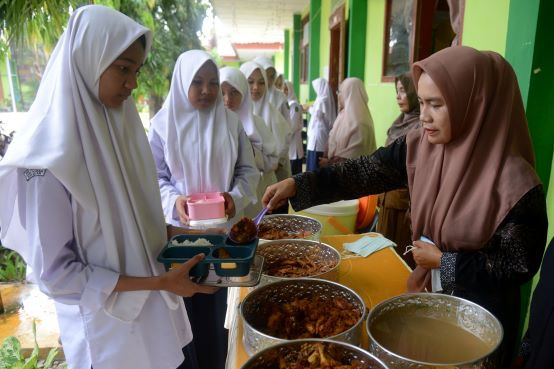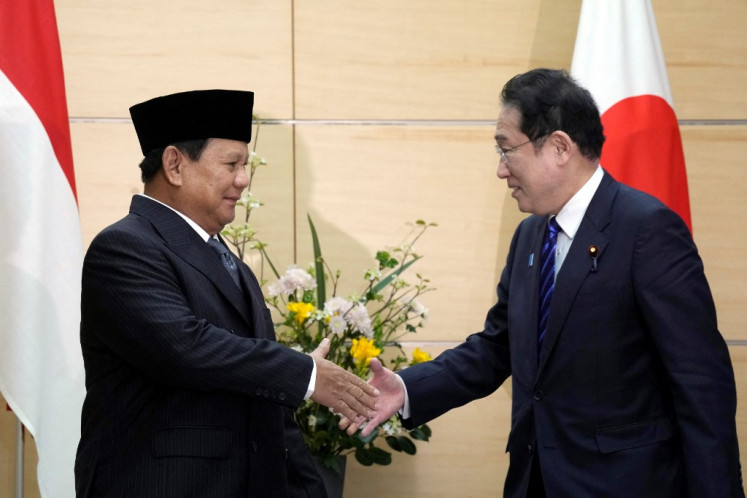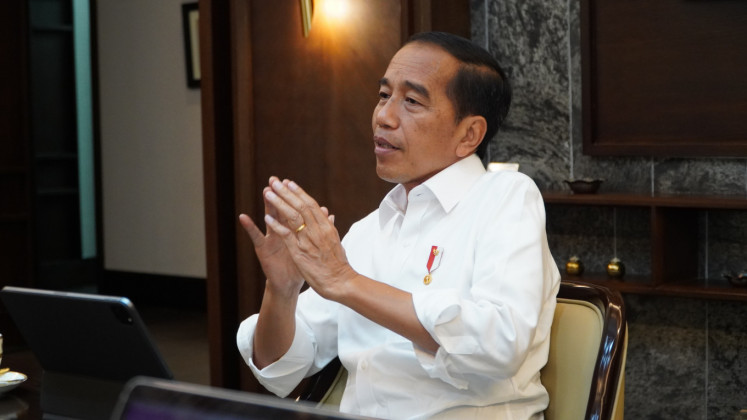Analysis: Now Jokowi has a party he can call his own
President Joko “Jokowi” Widodo now has a political party he can call his own after his youngest son Kaesang Pangarep took control of the Indonesian Solidarity Party (PSI) this week, only three days after he was inducted as a member.
Change Size
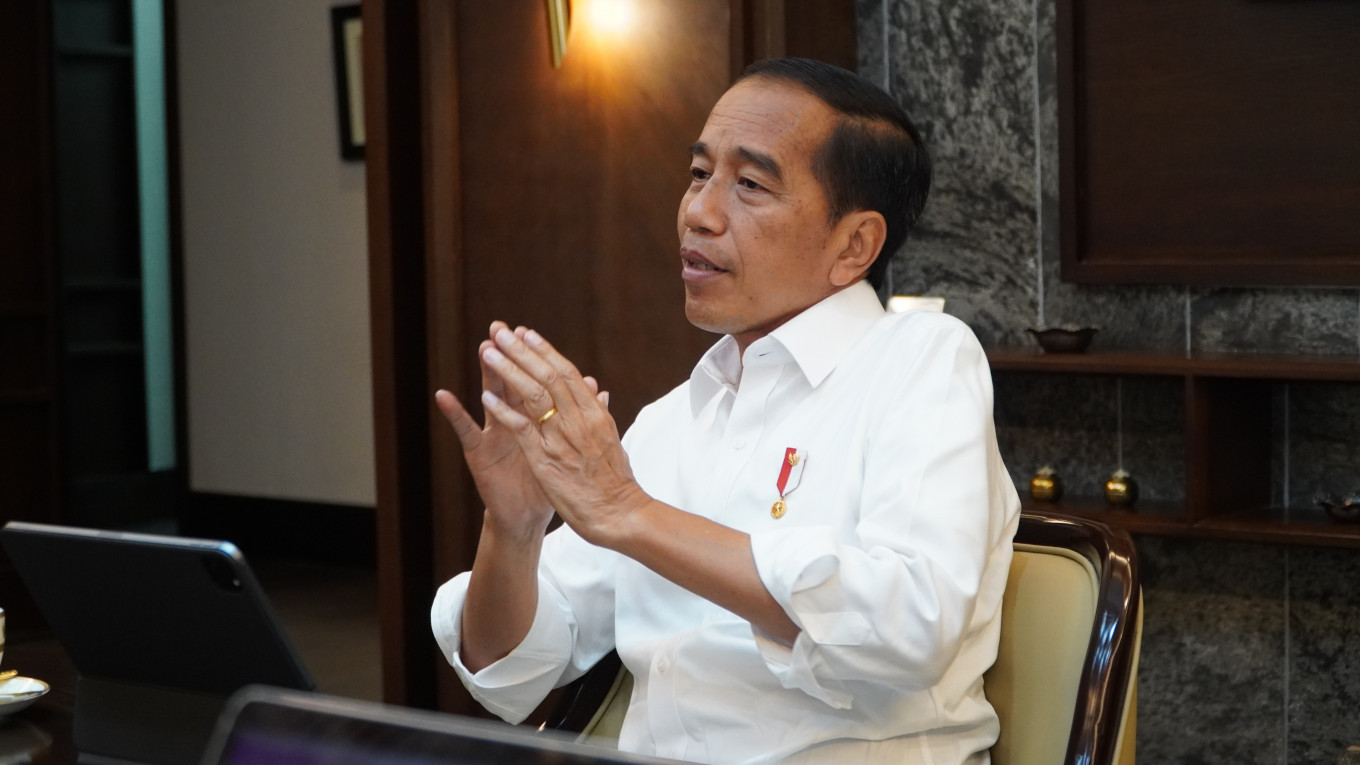 President Joko “Jokowi“ Widodo talks to journalists from The Jakarta Post during an interview at the Presidential Palace in Jakarta on Nov. 2. (JP/Abdur Rahim)
President Joko “Jokowi“ Widodo talks to journalists from The Jakarta Post during an interview at the Presidential Palace in Jakarta on Nov. 2. (JP/Abdur Rahim)

President Joko “Jokowi” Widodo now has a political party he can call his own after his youngest son Kaesang Pangarep took control of the Indonesian Solidarity Party (PSI) this week, only three days after he was inducted as a member. This prepares the ground for the incumbent to continue exercising some control over the 2024 presidential election, in which he is constitutionally barred from running after serving two five-year terms, and to remain active in politics after he steps down in October next year.
The stage is also set for a showdown between him and Megawati Sukarnoputri, the chair of the Indonesian Democratic Party of Struggle (PDI-P). Jokowi is still a card-carrying member of the party and Megawati has often disparagingly called him an “official” of the party who must obey the chair. With the PSI now under his control, indirectly through Kaesang, Jokowi has further empowered himself in his dealing, or rather his fights, with Megawati.
The PSI, which considers itself as a party for millennials, has endorsed the candidacy of defense minister Prabowo Subianto in the February presidential election. This is unlikely to change under Kaesang’s chairmanship. Jokowi has refrained from giving his endorsement to either Prabowo or the PDI-P’s presumptive presidential candidate, former Central Java governor Ganjar Pranowo. This is the first sign that Jokowi and Megawati are drifting apart politically.
Although he does not chair a political party, Jokowi has led Indonesia since 2014, winning the presidential election then, and the next one in 2019. Each time, he has governed through coalitions of several parties. He expanded the coalitions to prevent any party, including his own PDI-P, from being too dominant. He has mastered the art of coalition management, playing one party against another, to help sustain his power all this time.
Approaching 2024, Jokowi has been bending over backward to secure his power and influence. He sought to amend the Constitution that would have allowed him to run for a third term, but failed. He tried to get the Constitutional Court to lower the minimum age to run for president and vice president from 40 to 35 years, a move which would allow eldest son Gibran Rakabuming Raka to contest the election as running mate to Prabowo. A decision on this is imminent, the reason why Team Prabowo has yet to name its vice-presidential candidate.
Taking control of a political party, albeit small but with a lot of potential, is another sign of Jokowi’s political dynasty in the making. Son Gibran is mayor of Surakarta in Central Java and son-in-law Muhammad Bobby Alif Nasution is mayor of Medan in North Sumatra. Kaesang has been groomed to contest the election for the mayor of Depok, West Java, next year. The PSI is the missing piece in the creation of the Jokowi dynasty.

When news first emerged last week that Kaesang was joining the PSI, instead of the PDI-P to follow in his father’s footsteps, many people, including those in the PDI-P, did not give it much thought, dismissing it as his political right, of no consequence to the political and electoral landscapes.
What’s more
No one foresaw that the 28-year-old with zero experience in political parties was to be named the chair. This is a real game changer, as far as Jokowi’s plan to remain powerful and influential in the run-up to the general elections and after he leaves his office.
When it made its electoral debut in 2019, the PSI won only 1.89 percent of the national vote, not enough to send its politicians to the House of Representatives. By naming Kaesang as chair, as inexperienced as he is, the party hopes to cash in on Jokowi’s huge popularity, including the millions of loyal volunteers, known as Jokowers. They are non-partisans who will vote for the presidential candidate and party that he directs them toward.
Their numbers are not known, but their meetings have always been well attended. Most opinion surveys put Jokowi’s popularity rating between 70 and 80 percent, remarkably high for a president with just a year to go and no prospect of staying on after 10 years.
In the last meeting with a group of volunteers called “Merah Putih Solidarity National Congress” in Bogor last week, Jokowi told them “Let’s not rush into making our decisions on who to vote for. I can be patient, so you should be too. Let’s see what sort of coalitions are emerging and who are the candidates.” The man is clearly biding his time.
The PDI-P and Megawati, and their candidate Ganjar, stand to lose the most from Jokowi’s latest maneuver in taking control over the PSI. Not only could Ganjar lose the election – he and Prabowo have been head-to-head in opinion polls – the PDI-P could also lose its place as top party that it won in 2014 and 2019, riding on Jokowi’s popularity.
Ideologically, the PSI in many ways is like the PDI-P, progressive politically but conservative economically, in the center-left of the political spectrum. Most other parties are to their right. Any PSI gains in the coming legislative elections will likely come at the PDI-P’s expense.
Responding to the news of Kaesang being named as PSI chair, Megawati’s daughter Puan Maharani, who is also speaker of the House, has openly suggested that the PSI switch its support for Prabowo to candidate Ganjar.
Kaesang responded: “We are open to the idea of working with the PDI-P, as long as it’s a win-win.” It’s hard to see this happening in the zero-sum game of the presidential elections.
What we’ve heard
Several politicians who are aware of the matter said that initially President Jokowi had prepared Communication and Information Minister Budi Arie Setiadi as the replacement for Giring. However, this plan changed after three PSI Advisory Council members—Jeffrie Geovanie, Grace Natalie, and Raja Juli Antoni—met with Jokowi in early September. "Kaesang was confirmed as the party chairman at that time," said one source.
These sources confirmed that Kaesang's political decision has put Jokowi on a collision course with the Indonesian Democratic Party of Struggle (PDI-P) chairwoman Megawati Soekarnoputri. Nevertheless, Megawati has instructed PDI-P members not to comment on Kaesang's election as the PSI chairman.
Two sources familiar with the dynamics mentioned that Megawati instructed PDI-P secretary general Hasto Kristiyanto to order all party functionaries not to issue negative statements about Jokowi and his family. Meanwhile, people within the Palace's circle said that Jokowi also tried to show continued support for Ganjar by asking his eldest son Gibran Rakabuming Raka and son-in-law Bobby Nasution to remain members of the PDI-P.
Sources within PSI's circle said that in the early discussions with PSI officials, Kaesang expressed disappointment with the party's funding sources, which he deemed suboptimal. Additionally, Kaesang also faced some difficulties in changing the composition of legislative candidates as they had already been submitted to the General Election Commission (KPU).
However, according to this source, Kaesang has vowed to lead the party to becoming a parliamentary party for the first time. The source said Kaesang deems beating the parliamentary threshold of 4 percent is not enough; he wants 7 percent.
Disclaimer
This content is provided by Tenggara Strategics in collaboration with The Jakarta Post to serve the latest comprehensive and reliable analysis on Indonesia’s political and business landscape. Access the latest edition of Tenggara Backgrounder to read the articles listed below:
Politics
- Prabowo paving the way for military to reenter politics?
- Supreme Court drops trillions of economic losses in appeal ruling
- Government to grant special power to IKN Authority
Business and Economy
- No easy feat to link Musk’s Starlink with Indonesia
- Airfares spike, shrunken aircraft fleet overwhelmed
- Indonesia bans TikTok from selling products directly to users
- Indonesia's maiden carbon exchange aims high, to achieve NZE 2060



